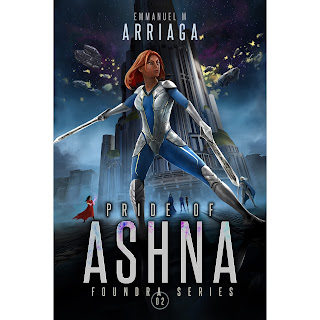New Book Alert: Pride of Ashna (Foundra Series 02) by Emmanuel W. Arriaga; Brilliant Epic Multi Character and World Building Makes One Of The Best Science Fiction Novels of 2021
By Julie Sara Porter
Bookworm Reviews
Spoilers: Recently, I have read Reality Testing and Court of the Grandchildren, two Science Fiction Novels that offer pessimistic views of the future: worlds destroyed by the overabundance of technology in the former and environmental catastrophe in the latter.
Reading such novels is enough to leave one in despair wondering what is the point in reading books about the future if they predict that there isn't going to be one.
Pride of Ashna Book 2 of the Foundra Series by Emmanuel W. Arriaga captures the other side of the coin in Science Fiction. It discusses dark things like war, prejudice, tyranny, and government conspiracies. However, it also reminds us that there is another side to Science Fiction: the side that leaves us to wonder, imagine possibilities, create new worlds of alien races, and dream of the lengths that we can go to with technology, space travel, and other things.
In some ways, Pride of Ashna is a space opera in the style of Star Wars, one that imagines a universe filled with fascinating creatures, plenty of action and adventure, conflict, and impressive character and world building that goes into the telling such a tale.
Pride of Ashna is a multi-character narrative in which several characters offer their perspective of the events that happen, providing a wider scope than just one select group. Because of this, several plots are going on but are all joined together by the end.
First, the Ashna Maidens, a group of female warriors, are trying to protect the Outer Rim worlds from bandits and pirates. One of their members is Serah'Elax Rez Ashfen who is on the fast track to becoming a leader to her people.
We also have a race of immortal beings, who are connected to enesmic energy, an elemental force that can be manipulated by certain beings. Some of these immortals lead nations like Lanrete, founder of the Huzien Alliance. Some fill their personal pleasures like Lanrete's ex wife, A'Amira Shen who sleeps with anyone that she can seduce. Some beings are pure enesmic energy, some wise and mysterious and others destructive and chaotic. During the book, a ship, the Empress Star, is hijacked and the Ashna Maidens are infiltrated from within.
There are also some more personal stories going on such as that of Secnic (master of technology) Captain Neven Kenk and Sencic-Cihphist (wielder of intense power such as telepathy and telekinesis), Zun Shan who begin a romance and navigate their way into a real relationship. As well as the affair between Soahc, an Immortal and Brime, his assistant turned lover, as they study the enesmic energy up close and personal.
Like I said, there are plenty of things going on to show how vast this universe is but it shows the brilliant depths of Arriaga's imagination. There are various races with unusual traits such as the golden skinned Huziens or the feline like Uri. Cultures are explored. For example we learned how Ashna Maidens are recruited as young children, raised as warriors, and that they take a vow of celibacy.
We also learn that some characters can obtain immortality through enesmic energy and how such a long life affects those around them when they outlive children, spouses, friends, and sometimes their whole worlds.
There is a helpful appendix so the Reader doesn't get confused by all of the names, planets, and terms. If the Reader doesn't understand when a character calls another "obrehen", the Glossary tells us that it is the Huzien word for blood brother. We also learn that the often repeated word "vusg" is what you say when something goes wrong. (Every culture has its swear words, even outer space ones.) Since Pride of Ashna is Book 2 in the Foundra Series, the Glossary helps provide some much needed exposition so the Reader doesn't get too lost if they haven't read Book 1.
Besides a monumental and successful feat in setting and world building, Pride of Ashna is great in characterization. There are several brilliant moments that deepen our understanding of these individuals that live, work, and thrive in this universe.
There are various moments in which characters shine. Throughout the book, Lanrete composes Founder's Logs that read like journal entries, so we experience what it's like first hand the changes in this galaxy and what he lay witness to as well what a long life of wisdom and regret has done.
Humor is found as well, such as when after winning in a physical competition, Uri Combat Leader Tashanira Yen Unvesel takes her prize by putting her feline claws on Huzien Chief Medical Officer Jenshi Runso. The two are enjoying their coital bliss so much that they are at first unaware that their ship, the Empress Star is being hijacked until someone tells them
We also see plenty of horror. When space pirate Vexl Jabstremn takes over the Empress Star, he guns down the command crew demanding that they take him to certain coordinates. The Captain and First Officer bravely demand a guarantee for the safety of their crew before they are shot down. A terrified Second Officer is one of the few remaining command crew members left to acquiesce to Vexl's demands.
One of the most frightening characters is Sephan The Deceiver, an enesmic being. He possesses the body and soul of Cihphist Breshna Vecen. His goal is for Breshna to gain access to the Ashna Maidens so he can deceive, conquer, and eventually lead them. Breshna has enough power to hear and see everything that Sephan makes her do and to feel remorse which Sephan gets off on
In a large ensemble cast, sometimes it is easiest to pick out the favorite characters. In this book, there are two: Serah'Elax Rez Ashfen and Neven Kenk. Serah'Elax's journey is that of a warrior raised within a culture and questioning it for the first time.
Since her childhood, after the death of one of her mothers, Serah'Elax has been trained by the Ashna Maidens. Even though her birth mother has become a pleasure seeking prostitute, Serah'Elax prefers the celibate controlled life of the Maidens. She is a brave commander leading her army of Maidens to defend others. However, she is a character who lives by the absolutes of the Maidens.
She had been raised to never question her culture until circumstances forced her to. Breshna inside Sephan frames Serah'Elax and she is put into exile. During that time, she interacts with various characters that cause her to question her beliefs. While she is just as brave and just as strong as before, she gains more of an understanding towards others. She realizes that the Maidens' standards are too rigid and confining and they have Sephan to manipulate them so easily because of their arrogance and ethnocentrism. Serah'Elax becomes a better leader by gaining this knowledge and acceptance
Another fascinating character is Neven Kenk not because he is strong or powerful, but because he is so ordinary. Even though he is a Sencic Captain, so he has some power, but he mostly just does his job of working on technology. To paraphrase a line from Star Wars Episode II: Attack of the Clones, Neven is "just a simple man trying to make (his) way in the Universe."
While all of this action and larger scope drama is happening around him, Neven is mostly concerned with his personal issues such as maintaining a romance with Zun. They have to overcome many obstacles like Zun's sadness from her late husband's death or that Neven is raped by A'Amira. (I also would like to give kudos to Arriaga for portraying a rape towards a male character by a female not as a joke or a situation in which he finds stimulating or enjoyable. He is traumatized as any female character would be in this situation and it's treated seriously by the other characters.)
Neven's story arc is small, but that's the point. He is the average person in this Universe just trying to live his life during desperate times probably no different than his Readers. He just wants to work and fall in love. His journey is so interesting because it's so human and relatable.
Pride of Ashna is a monumental but incredible feat in Science Fiction works building and characterization. Truly, it is one of the best Science Fiction Novels of this year.









